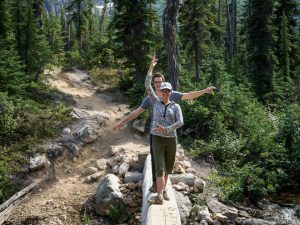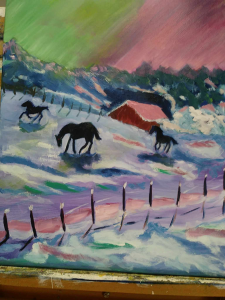 The Columbia City Yoga on-line Moving into Meditation class met this morning. Today we explored how our beginner’s mind helps us to access our playful instincts. Like the practice of mindfulness we can explore life in a fresh, imaginative way. A beginner’s mind is an open mind. An open mind helps to open our hearts: again and again and again.
The Columbia City Yoga on-line Moving into Meditation class met this morning. Today we explored how our beginner’s mind helps us to access our playful instincts. Like the practice of mindfulness we can explore life in a fresh, imaginative way. A beginner’s mind is an open mind. An open mind helps to open our hearts: again and again and again.
We continued to draw from Oren Jay Sofer’s book: Your Heart Was Made for This: Contemplative Practices for Meeting a World in Crisis with Courage, Integrity, and Love. In his chapter on play Oren describes the many qualities of play that enable us to flourish. Becoming fully absorbed in play is quite similar to mindful presence. Interactive play encourages empathy and learning. We can forget ourselves long enough to experience wonder.
I shared painter, musician and teacher, Pauli Maher’s experience of play. Pauli observed that work becomes play with enjoyment and imagination.
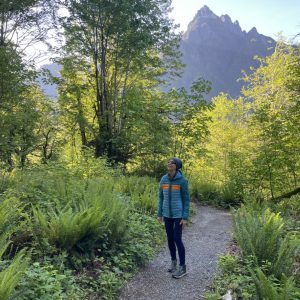 We drew inspiration from Jack Gilbert, a poet who inspired writer Elizabeth Gilbert. Elizabeth’s Big Magic: Creative Living Beyond Fear, is a wonderful exploration of living a creative life.
We drew inspiration from Jack Gilbert, a poet who inspired writer Elizabeth Gilbert. Elizabeth’s Big Magic: Creative Living Beyond Fear, is a wonderful exploration of living a creative life.
We heard poet and writer Ross Gay’s comments about the practice of looking for delight during his year long writing of The Book of Delights. These comments are from his fascinating On Being interview with On Being’s Krista Tippett: On the Insistence of Joy.
We heard poet Carrie Newcomer’s Blessing for play.
Welcome. Last week we explored the intertwining threads of generosity and gratitude. Generosity arises from the fertile ground of relationship. When we nurture relationships we experience joy. When we play, we relate to one another with Shoshin, or beginner’s mind. We meet life with curiosity, openness and a willingness to try something new. Oren writes about the role play in our lives:
Play unlocks a storehouse of joy and vitality in us, supporting healthy social, emotional, and neurological development. As they explore their bodies and emotions through play, children learn to engage, cooperate, set limits and build relationships.
Play encourages imagination, creativity and endurance. In humans, playfulness is tied to flexibility, empathy, altruism, problem solving and resilience.
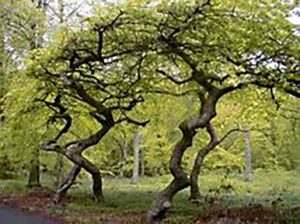 . . . laughter and lightness of play are essential to keeping the heart nimble, accessing creativity and maintaining healthy perspective. . . . play infuses our being with vital energy and protects our hearts from stagnation and hopelessness.
. . . laughter and lightness of play are essential to keeping the heart nimble, accessing creativity and maintaining healthy perspective. . . . play infuses our being with vital energy and protects our hearts from stagnation and hopelessness.
Play lets us enjoy this moment and laugh at what happens next. It’s fun, alive . . . Play is recreation . . . creativity . . . play is more: socializing, debate, cooking . . even meditation.
I asked my sister-in-law, artist Pauli Maher, how she experiences play. Pauli is a painter, musician and teacher. She said:
. . . for me, play is incorporated in the work. I play my instruments. I played when I did the fairy garden. Imagination is play. If I come up with a painting from my imagination, it’s play. If I’m not enjoying what I’m doing, it’s work. But work can be play and play is the work of children. We learn from play.
 Pauli’s comments reflect beginner’s mind: a mind of a curious child engaged in the moment. There is so much freedom when we can move beyond our preconceptions and fixed ideas. The spirit of play is enlivening and also restorative. When I play it is easy to forget my problems at least momentarily. When I play something awakens inside me: I step off the habit trail, go in a different direction, entertain new ideas and ways of being in relationship. I can sometimes feel the fear and do the scary thing anyway.
Pauli’s comments reflect beginner’s mind: a mind of a curious child engaged in the moment. There is so much freedom when we can move beyond our preconceptions and fixed ideas. The spirit of play is enlivening and also restorative. When I play it is easy to forget my problems at least momentarily. When I play something awakens inside me: I step off the habit trail, go in a different direction, entertain new ideas and ways of being in relationship. I can sometimes feel the fear and do the scary thing anyway.
I sense that my world may have gotten smaller as I’ve aged. When I weigh the rewards and the risks of living more expansively it is easy to recognize the vital value of play. In her book, Big Magic, Elizabeth Gilbert writes about how the poet Jack Gilbert inspired her creative life. Jack once said:
We must risk delight. We must have the stubbornness to accept our gladness in the ruthless furnace of this world.
Wow. Can I be receptive to the creative spark inside? Can I be true to my playful instincts? Poet and teacher, Ross Gay, has made an everyday spiritual discipline of practicing delight and cultivating joy. In discussing the daily writing of his Book of Delights Ross said:
Many things surprised me, I suppose. But one of the things that surprised me was how quickly the study of delight made delight more evident. . . . if you spend time looking at the flower, any flower . . . it’s like, I’ve never seen anything. And you can do it again and again and again and again and again. It’s crazy to me. . . It’s made my life better.
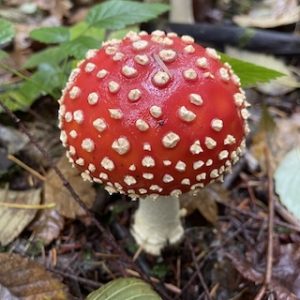 It seems like the key to play is presence and the willingness to feel. And there is the willingness to acknowledge my inner child. Like mindfulness, play involves entering the ever-changing and impermanent flow of life. We can approach our mindfulness practice with curious, “don’t know,” open, minds.
It seems like the key to play is presence and the willingness to feel. And there is the willingness to acknowledge my inner child. Like mindfulness, play involves entering the ever-changing and impermanent flow of life. We can approach our mindfulness practice with curious, “don’t know,” open, minds.
Here is poet Carrie Newcomer’s Blessing:
May you wake with a sense of play,
An exultation of the possible.
May you rest without guilt,
Satisfied at the end of a day well done.
May all the rough edges be smoothed,
If to smooth is to heal,
And the edges be left rough,
When the unpolished is more true
And infinitely more interesting.
[May you wear your years like a well-tailored coat
Or a brave sassy scarf.
May every year yet to come:
Be one more bright button
Sewn on a hat you wear at a tilt.]
May the friendships you’ve sown
Grown tall as summer corn.
And the things you’ve left behind,
Rest quietly in the unchangeable past.
May you embrace this day,
Not just as any old day,
But as this day.
Your day.
Held in trust
By you,
In a singular place,
Called now.
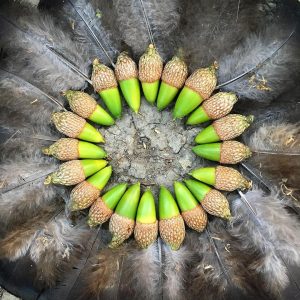 Let’s enter this singular place called now. I invite you to adjust your posture as you need to be at ease, relaxed, awake. You might lie down or recline in an easy chair. Give yourself some moments to let the body settle. Can there be a gradual letting go of doing? Sense the experience of being just as you are without trying.
Let’s enter this singular place called now. I invite you to adjust your posture as you need to be at ease, relaxed, awake. You might lie down or recline in an easy chair. Give yourself some moments to let the body settle. Can there be a gradual letting go of doing? Sense the experience of being just as you are without trying.
As your body settles there may be release, a sigh or subtle letting go of holding. You might follow the experience of breathing or simply rest in the experience of being. See if you can welcome all that you are noticing. There may be feelings, sensations and thoughts emerging changing and subsiding.
I invite you to explore a sense of spaciousness inside. Move awareness through the body attuning to areas of openness, volume or flow. You might discover areas of lightness and energy. Relax and breathe into the space and time of your experience. Widen your focus with a sense of allowing. Explore the body as a field of energy. Can you be curious and open to what arises?
 I invite you to recall a time when you were playful. You may have been a child, a teenager or an adult. Maybe you cannot recall a time when you were playful. That’s okay. You can imagine your playful self. Create all the details you can in your mind. Where you were. What you were doing. Who you were with. How did this playfulness feel in your body? Tune into the qualities that made this experience playful. Perhaps a simple feeling of being care-free, happy, discovering something new, having fun, creating something, fully immersed in the experience. Take a few moments to savor these qualities, absorbing any good feelings they bring.
I invite you to recall a time when you were playful. You may have been a child, a teenager or an adult. Maybe you cannot recall a time when you were playful. That’s okay. You can imagine your playful self. Create all the details you can in your mind. Where you were. What you were doing. Who you were with. How did this playfulness feel in your body? Tune into the qualities that made this experience playful. Perhaps a simple feeling of being care-free, happy, discovering something new, having fun, creating something, fully immersed in the experience. Take a few moments to savor these qualities, absorbing any good feelings they bring.
Take in the nature of this playful instinct inside you. How does it live and express itself in your life today? Oren reminds us that “life is uncertain, we make it up as we go.” Our practice can teach us to appreciate “life on its own terms.” We can “explore experience in a dynamic, creative way.” We can “allow the interplay of thoughts, sounds and sensations to flow.” We can “watch how everything comes and goes by itself, a dance of life.”
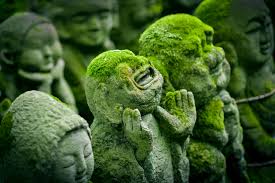 Rest quietly. Feel any sense of well being.
Rest quietly. Feel any sense of well being.
May you embrace this day,
Not just as any old day,
But as this day.
Your day.
Held in trust
By you,
In a singular place,
Called now.

